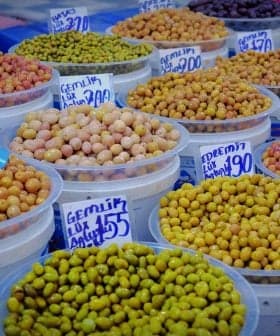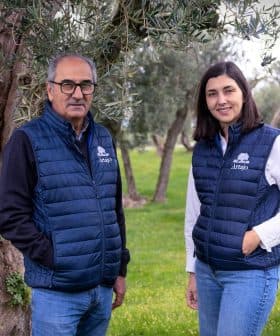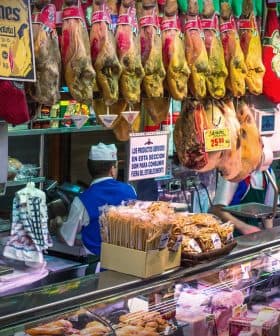Spanish Olive Oil Sector Works to Develop Exports to China

Spanish olive oil producers are focusing on expanding into the Chinese market due to increasing demand driven by a growing middle class interested in healthy eating. While there are challenges such as the perception of olive oil as a specialty gift rather than a kitchen staple, Spanish producers have a pricing advantage over Chinese producers and are capitalizing on the growing consumer interest in olive oil in China.
Olive oil producers in Spain are working to develop new international markets, especially in China, as historically high prices have changed consumer habits in the European Union.
“China will be a strategic market for Spanish products,” said Jaime Lillo, the executive director of the International Olive Council (IOC).
This year, more trees have been planted in Gansu, but the market is not interested because they want E.U. olive oil.
He added that China’s growing “demand for olive oil has a lot to do with the rise in salaries among the Chinese population and the increasing number of people who are interested in eating healthy and who can afford olive oil that is more expensive than alternative oils.”
According to a report from Knight Frank, a real estate consultancy, China’s ultra-wealthy population is expected to increase by 47 percent by 2028.
See Also:Despite Production Woes, Spain Anticipates Expanding Organic Exports to China“This growth reflects China’s burgeoning middle class, advancements in technology and the expansion of industries that create significant new wealth,” the report noted.
Spanish producers and exporters have long identified China’s rising middle class as a high-potential market.
According to IOC data, Chinese olive oil consumption has increased from 12,000 tons in the 2008/09 crop year to 42,500 tons in 2022/23. Over the same period, Spanish trade data show that virgin and extra virgin olive oil exports to China rose from 3,638 tons to 27,172 tons
Daxue Consulting, specializing in consumer trends in China, attributed increasing consumption to more of the Chinese middle class traveling to the Mediterranean and developing a taste for olive oil.
Indeed, the Interprofessional Association of Spanish Olive Oil, a trade group, has sought to capitalize on the growing appetite, recently hosting two events in Beijing.
The first was geared at the media and influencers and included tasting various Spanish extra virgin olive oils, a cooking demonstration and a talk about olive oil’s health benefits.
The interprofessional also held a tasting event for distributors and importers in Beijing, intending to establish a close relationship with the country’s retail promoters.
However, Antonio Carrasco, the general manager of Goya en España, warned that exporters must understand the Chinese market’s idiosyncrasies to take full advantage.
In a 2023 interview, Carrasco said that Chinese consumers still see olive oil as a specialty food and novel gift rather than a kitchen staple.
He further noted that 80 percent of olive oil sales in the world’s second-largest economy are for gifts in Goya’s experience. Companies must have well-developed supply chains in China to capitalize on these dynamics.
“You have to have a distribution to reach that gift market,” Carrasco said. “But, growth is very difficult and very slow from the point of view of consumption and health. It is a growth in gifts at a certain time, such as the Chinese New Year.”
Meanwhile, Olive Times founder Jane Gong, an award-winning olive oil producer in Gansu, said that although the olive oil market is growing, Chinese customers do not tend to distinguish between extra virgin olive oil and the other grades.
“In the E.U., people make the distinction between extra virgin olive oil, virgin olive oil and non-virgin olive oil, but in China, it’s all olive oil,” she said.
Gong added that a further challenge facing olive oil sellers in the Chinese market is the limited use of olive oil in food preparation. While many consumers cook with olive oil, she said using it in salads, ice cream and marinades is still relatively rare.
Despite the company’s Whispering Flowers brand, an Ezhi‑8 monovarietal, earning a Silver Award for the third consecutive year at the 2024 NYIOOC World Olive Oil Competition, Gong believes that imports are likely to remain more competitive due to the high production costs in China. “The economies of scale are smaller, so prices are higher,” she said.
As a result, Spanish and other E.U. olive oil producers have a significant pricing advantage when entering the Chinese market.
“In China, more than 90 percent of imports come from the E.U.,” Gong said. “There has been a 10 to 15 percent increase from last year.”
Citing data from Taobao, an online shopping platform, she added that business-to-business sales have grown significantly along with business-to-consumer sales.
“Furthermore, these consumers look for well-known and exclusive brands as they suggest credibility and high quality,” Gong said. “However, a substantial lack of knowledge about olive products still exists.”
“The Chinese also prefer foreign olive oil, which now costs more than last year,” she added. “This deters some customers. This year, more trees have been planted in Gansu, but the market is not interested because they want E.U. olive oil.”
Gong pointed out that younger consumers in large cities are one of the main segments of the population driving olive oil consumption in China. “In smaller cities, customers prefer peanut, soybean, and vegetable oil,” she added.
According to the IOC, the main regions of demand in China are the Beijing, Shanghai, and Guangzhou metro areas, home to nearly 100 million people.
However, rising youth unemployment, up by 15 percent compared to last year, will likely present short-term challenges to Spanish exporters, as will changing eating habits.
“Olive oil imports may encounter difficulties as more and more people are buying takeaway and not cooking anymore,” Gong said. “This is not because takeaway is cheaper, but because it is more convenient.”









